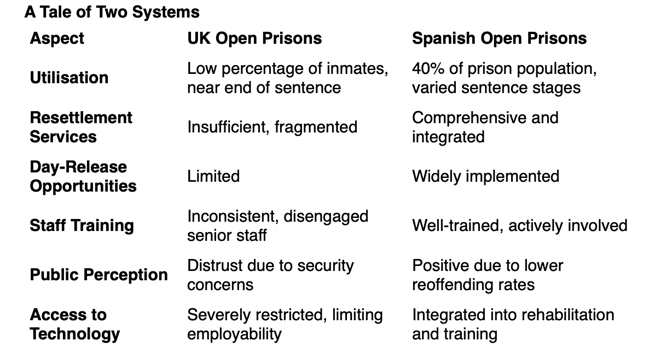The Open Prison Dilemma: A Tale of Two Systems
3 min read
Should more prisoners in the UK be sent to open prisons? David Gauke, former justice secretary, thinks so. He believes that expanding open prisons could help tackle overcrowding and reduce reoffending rates. Gauke’s vision isn’t just theoretical—it’s inspired by what he saw in Spain. These facilities give prisoners more freedom to work and study outside during the day, helping them prepare for life after release.
Gauke argues that this approach saves money, better promotes prisoners’ reintegration to society, and ultimately keeps people from reoffending. It’s a refreshing perspective on the UK’s struggling prison system, which is in desperate need of fresh ideas. But can the UK adopt such a bold model, or will it remain stuck in its outdated ways?
A System Failing Its Purpose
The idea behind open prisons is simple: help offenders reintegrate into society. In practice, though, the UK’s approach seems to miss the mark. Too many prisoners leave open prisons without the basic support they need to succeed. Housing? Patchy at best. Job opportunities? Scarce. Mental health support? Almost non-existent. It’s no wonder many fall back into old habits.
To make matters worse, open prisons in the UK are underused. They’re mostly reserved for low-risk offenders nearing the end of their sentences. It’s a missed opportunity to expand their reach and make rehabilitation a priority for more prisoners.
And then there’s the attitude of some senior staff. Reports suggest these roles are sometimes seen as a cushy pre-retirement gig. With disengaged leadership, it’s hard to foster the innovative, proactive approach that rehabilitation requires.
Public perception doesn’t help either. Rare incidents of escapes or absences dominate the headlines, fuelling distrust. Politicians often bow to public fears, favouring harsher policies over solutions that actually work.
Unhelpful Restrictions on Technology
One glaring flaw in the UK’s open prisons is their outdated stance on technology. Inmates often aren’t allowed to use smartphones, access the internet, or engage with social media. In today’s world, this is a huge setback. How can someone hope to find a job or navigate modern life without basic tech skills?
These restrictions cut prisoners off from opportunities to learn and adapt. Whether it’s job hunting online, using communication tools, or just understanding how the digital world works, this gap leaves them ill-prepared. If supervised access to technology were allowed, it could make a world of difference, giving inmates the skills they need to thrive outside prison walls.
The Spanish Alternative
Spain shows us how open prisons can work. Around 40% of their prison population is housed in these facilities. Unlike in the UK, Spain’s open prisons aren’t just for those nearing release. They’re for inmates at various stages, offering broader rehabilitation opportunities.
A standout feature of Spain’s system is its day-release programs. Inmates work, study, or attend treatment during the day and return to the prison at night. This setup helps ease the transition to life outside, reducing the shock of full release and slashing reoffending rates. The UK’s day-release schemes, by comparison, are rare and often poorly implemented.
Spain also invests heavily in support services. Vocational training, counselling, and family reintegration programs are all part of the package. Meanwhile, the UK’s efforts in these areas are inconsistent at best.
Another big difference? Spanish prison staff are well-trained and genuinely committed to helping inmates turn their lives around. They actively work with inmates to address individual challenges and build skills for the future. Compare that to the disengaged approach seen in some UK facilities, and the gap becomes glaringly obvious.
A Path Forward
The UK’s open prison system is crying out for change. Here’s what needs to happen:
Use Open Prisons More: Let more inmates into open prisons earlier in their sentences to maximise their rehabilitative impact.
Better Resettlement Support: Provide solid housing, job opportunities, and mental health care for inmates to stand a chance outside.
Train and Motivate Staff: Invest in staff training and hire people passionate about rehabilitation.
Expand Day-Release Schemes: Let inmates work, study, or get treatment during the day, just like in Spain.
Change Public Perception: Share success stories and focus on what works, not on rare sensational incidents.
Allow Controlled Tech Access: Give inmates supervised access to technology for learning and job preparation. It’s the 21st century, after all.
The UK’s current approach to open prisons is a missed opportunity. By learning from Spain, we could create a system that truly helps inmates reintegrate and stay out of trouble. The question is: do we have the courage to make it happen?

